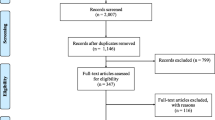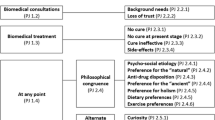Abstract
With the prevalence of complementary and alternative medicine (CAM) increasing in western societies, questions of the ethical justification of these alternative health care approaches and practices have to be addressed. In order to evaluate philosophical reasoning on this subject, it is of paramount importance to identify and analyse possible arguments for the ethical justification of CAM considering contemporary biomedical ethics as well as more fundamental philosophical aspects. Moreover, it is vital to provide adequate analytical instruments for this task, such as separating ‘CAM as belief system’, and ‘CAM as practice’, Findings show that beneficence and non-maleficence are central issues for an ethical justification of CAM as practice, while freedom of thought and religion are central to CAM as belief system. Many justification strategies have limitations and qualifications that have to be taken into account. Singularly descriptive premises in an argument often prove to be more problematic than universal ethical principles. Thus, non-ethical issues related to a general philosophical underpinning - e.g. epistemology, semantics, and ontology - are highly relevant for determining a justification strategy, especially when strong metaphysical assumptions are involved. Even if some values are shared with traditional biomedicine, axiological differences have to be considered as well. Further research should be done about specific CAM positions. These could be combined with applied qualitative social research methods.
Similar content being viewed by others

References
Adams K.E., Cohen M.H., Eisenberg D., Jonsen A.R. 2002 ‘Ethical Considerations of Complementary and Alternative Medical Therapies in Conventional Medical Settings’. Annals of Internal Medicine 137:660–664
Albert H. 1985 Treatise on Critical Reason. Princeton, Princeton University Press
Angell M., Kassirer J.P. 1998 ‘Alternative Medicine—The Risks of Untested and Unregulated Remedies’, The New England Journal of Medicine 339:839
Astin J.A., Marie A., Pelletier K.R., Hansen E., Haskell W.L. 1998 ‘A Review of the Incorporation of Complementary and Alternative Medicine by Mainstream Physicians’, Archives of Internal Medicine 158:2303–2310
Barnes, P., Powell-Griner E., McFann K. and R. Nahin: 2004, CDC Advance Data Report #343. Complementary and Alternative Medicine Use Among Adults. United States, 2002. Centers for Disease Control and Prevention. http://www.cdc.gov/ (20.4.06)
Beauchamp T., Childress J. 2001; Principles of Biomedical Ethics. New York, Oxford University Press
Beyerstein B.L. 1999 ‘Psychology and Alternative Medicine. Social and Judgmental Biases That Make Inert Treatments Seem to Work’, The Scientific Review of Alternative Medicine 3(2):16–29
Callahan D. (ed.) 2002 The Role of Complentary and Alternative Medicine: Accommodating Pluralism. Washington, D.C., Georgetown University Press
Carroll, R.T.: 2003, The Skeptic’s Dictionary. Hoboken, NJ: Wiley John + Sons. See also: http://www.skepdic.com/ (11.4.2006)
Carroll, R.T.: 2006, What’s the harm? http://www.skepdic.com/refuge/harm.html (21.4.06)
Dalen J.E. 1998 ‘Conventional’ and ‘Unconventional’ Medicine: Can They Be Integrated? Archives of Internal Medicine 158(20):2179–2181
Drane J.F. 1995 ‘Alternative Therapies: Ethical and Legal Issues”, in: W.T. Reich (ed.) Encylopedia of Bioethics. New York, Simon & Schuster Macmillan, pp. 135–142
Eisenberg D.M., Kessler R.C., Foster C., Norlock F.E., Calkins D.R., Delbanco T.L. 1993 ‘Unconventional Medicine in the United States: Prevalence, Costs, and Patterns of Use’, The New England Journal of Medicine 328:246–252
Ernst E. 2000 The BBC Survey of Complementary Medicine Use in the UK. Complementary Therapies in Medicine 8:32–36
Ernst, E.: 2001, ‘Informed Consent in Complementary and Alternative Medicine’, Archives of Internal Medicine 161, 2288–2292
Ernst E. 2004 ‘Informed Consent: A Potential Dilemma for Complementary Medicine’, Journal of Manipulative and Physiological Therapeutics 27(6):428–429
Ernst E., Stone J. 2004 ‘Ethical Problems Arising in Evidence Based Complementary and Alternative Medicine’, Journal of Medical Ethics 30:156–159
Fontanarosa P.B., Lundberg G.D. 1998 ‘Alternative Medicine Meets Science’, JAMA 280:1618–1619
Fuller R.C. 1995 ‘Alternative Therapies: Social History’, in: W.T. Reich (ed.) Encyclopaedia of Bioethics. New York, Simon & Schuster Macmillan, pp. 126–134
German Medical Association [Bundesärztekammer]: 1998, ‘Stellungnahme der Arzneimittelkommission der deutschen ärzteschaft zu außerhalb der wissenschaftlichen Medizin stehenden Methoden der Arzneitherapie, Deutsches ärzteblatt 95, Heft 14, A-800, See also: http://www.bundesaerztekammer.de/30/Richtlinien/Empfidx/Altermed.html (20.4.2006)
Glazer, J.: 2005, ‘The Ethics of Alternative Medicine: An Alternative Standard?’, Family Practice Management April 2005, Editorial
Hacking I. 1999 The Social Construction of What? Cambridge/London, Harvard University Press
Hiller M. 1986 Ethical Decision-making in Health Management. Arlington, Association of University Programs in Health Management
Kaputchk T.J., Miller F.G. 2005 Viewpoint: What is the Best and Most Ethical Model for the Relationship Between Mainstream and Alternative Medicine: Opposition, Integration, or Pluralism? Academic medicine 80(3):286–290
Kaler M.M., Ravella P.C. 2002 Staying on the Ethical High Ground with Complementary and Alternative Medicine. The Nurse Practitioner 27(7):38–42
Kitcher P. 2001 Science, Truth and Democracy. Oxford/New York, Oxford University Press
Leuenberger, P. and C. Longchamps: 2001, Fachkompetenz von Ärztinnen und Ärzten gut, Sozialkompetenz verbesserungswürdig. Erwartungen der Bevölkerung an die Medizin. Ergebnisse einer reprÄsentativen Befragung in der Schweiz. Bern: gfs.bern, SAMS, See also: http://www.gfsbern.ch/gfs/medizin.html (28.5.2006)
Merton, R.K.: 1942, ‘Die normative Struktur der Wissenschaft’, in: Entwicklung und Wandel von Forschungsinteressen. Frankfurt a.M.: Suhrkamp
Nanda, M.: 2006, The State of Ayurveda: Examining the Evidence. http://www.butterfliesandwheels.com/articleprint.php?num = 190 (25.5.2006)
National Centre for Complementary and Alternative Medicine (NCCAM). National Institutes of Health (U.S.A.): http://nccam.nih.gov/ (20.4.2006)
Quackwatch: 2006, ‘Your Guide to Quackery, Health Fraud, and Intelligent Decisions.’, (Operated by Stephen Barrett, M.D.): http://www.quackwatch.org
Rawls J. 1971 A Theory of Justice. Cambridge (Mass.), The Belknap Press
Rhee S.M., Garg V.K., Hershey C.O. 2004 Use of Complementary and Alternative Medicine by Ambulatory Patients. Archives of Internal Medicine 164:1004–1009
Ruhl T.S. 2002 Spiritual Informed Consent for CAM. Archives of Internal Medicine 162:943–944
Runggaldier E., Kanzian C. 1998 Grundprobleme der Analytischen Ontologie. Paderborn, Verlag Ferdinand Schoeningh
Schnaedelbach H. 2000 Philosophie in der modernen Kultur. Frankfurt a.M., Suhrkamp
Swiss Academy of Medical Science (SAMS) [Schweizerische Akademie der medizinischen Wissenschaften (SAMW)]: http://www.samw.ch (28.5.06)
Thorne S., Best A., Balon J., Kelner M., Rickhi B. 2002 Ethical Dimensions in the Borderland Between Conventional and Complementary/Alternative Medicine. The Journal of Alternative and Complementary Medicine 8(6):907–915
Troehler U. and S. Reiter-Theil (eds.) (in collaboration with E. Herych): 1998, Ethics Codes in Medicine: Foundations and Achievements 1947–1997. Ashgate: Aldershot
Wardell D.W., Engebretson J. 2001 Ethical Principles Applied to Complentary Healing. Journal of Holistic Nursing 19(4):318–334
Van Duelmen R., Rauschenbach S. (eds.) 2004 Macht des Wissens. Die Entstehung der modernen Wissensgesellschaft. Cologne, Boehlau Verlag
Author information
Authors and Affiliations
Corresponding author
Rights and permissions
About this article
Cite this article
Mertz, M. Complementary and alternative medicine: The challenges of ethical justification. Med Health Care and Philos 10, 329–345 (2007). https://doi.org/10.1007/s11019-007-9050-x
Received:
Accepted:
Published:
Issue Date:
DOI: https://doi.org/10.1007/s11019-007-9050-x



